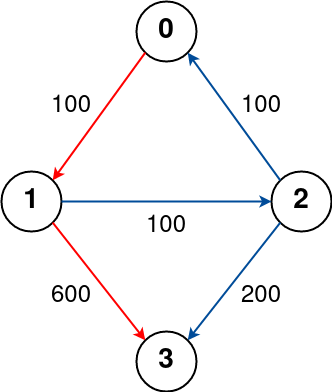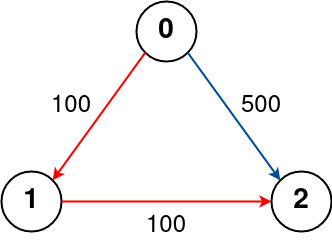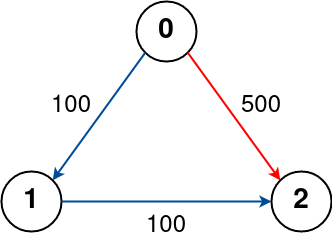⭐️⭐️⭐️
# 題目敘述
There are n cities connected by some number of flights. You are given an array flights where flights[i] = [fromi, toi, pricei] indicates that there is a flight from city fromi to city toi with cost pricei .
You are also given three integers src , dst , and k , return the cheapest price from src to dst with at most k stops. If there is no such route, return -1 .
# Example 1

Input: n = 4, flights = [[0,1,100],[1,2,100],[2,0,100],[1,3,600],[2,3,200]], src = 0, dst = 3, k = 1
Output: 700
Explanation:
The graph is shown above.
The optimal path with at most 1 stop from city 0 to 3 is marked in red and has cost 100 + 600 = 700.
Note that the path through cities [0,1,2,3] is cheaper but is invalid because it uses 2 stops.
# Example 2

Input: n = 3, flights = [[0,1,100],[1,2,100],[0,2,500]], src = 0, dst = 2, k = 1
Output: 200
Explanation:
The graph is shown above.
The optimal path with at most 1 stop from city 0 to 2 is marked in red and has cost 100 + 100 = 200.
# Example 3

Input: n = 3, flights = [[0,1,100],[1,2,100],[0,2,500]], src = 0, dst = 2, k = 0
Output: 500
Explanation:
The graph is shown above.
The optimal path with no stops from city 0 to 2 is marked in red and has cost 500.
# 解題思路
# Solution
import java.util.Arrays; | |
class Solution { | |
public int findCheapestPrice(int n, int[][] flights, int src, int dst, int k) { | |
int[] price = new int[n]; | |
Arrays.fill(price, 100000); | |
price[src] = 0; | |
for (int i = 0; i <= k; i++) { | |
int[] temp = new int[n]; | |
Arrays.fill(temp, 100000); | |
temp[src] = 0; | |
for (int[] flight : flights) { | |
temp[flight[1]] = Math.min(temp[flight[1]], price[flight[0]] + flight[2]); | |
} | |
price = temp; | |
} | |
return (price[dst] >= 100000) ? -1 : price[dst]; | |
} | |
} |
單字
** **
!! !!
片語 & 搭配詞
!! !!
